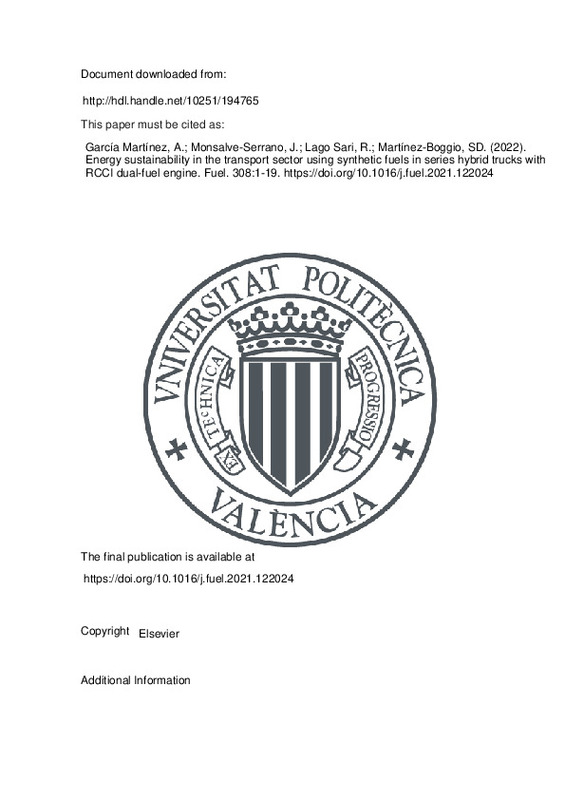JavaScript is disabled for your browser. Some features of this site may not work without it.
Buscar en RiuNet
Listar
Mi cuenta
Estadísticas
Ayuda RiuNet
Admin. UPV
Energy sustainability in the transport sector using synthetic fuels in series hybrid trucks with RCCI dual-fuel engine
Mostrar el registro sencillo del ítem
Ficheros en el ítem
| dc.contributor.author | García Martínez, Antonio
|
es_ES |
| dc.contributor.author | Monsalve-Serrano, Javier
|
es_ES |
| dc.contributor.author | Lago Sari, Rafael
|
es_ES |
| dc.contributor.author | Martínez-Boggio, Santiago Daniel
|
es_ES |
| dc.date.accessioned | 2023-07-10T18:02:11Z | |
| dc.date.available | 2023-07-10T18:02:11Z | |
| dc.date.issued | 2022-01-15 | es_ES |
| dc.identifier.issn | 0016-2361 | es_ES |
| dc.identifier.uri | http://hdl.handle.net/10251/194765 | |
| dc.description.abstract | [EN] The green-deal carbon neutrality target set for 2050 and CLOVE consortium predictions of NOx reductions confirm the efforts of the European commission to achieve a clean and sustainable transportation. In this sense, several solutions are needed to fulfill with the short-term regulation requirements and provide a sustainable transportation transition. This work assesses the potential and challenges of using a Reactivity Controlled Compression Ignition, RCCI, engine in a series hybrid medium duty truck fueled with both conventional and synthetic. The numerical results enabled to design the hardware and control system of the concept. Experimental results show a good agreement with numerical simulation estimation with CO2 tailpipe below 3%. Overall, using diesel and gasoline, it is possible to fulfill the current EUVI regulation without after-treatment while promoting benefits of more than 10% in CO2 Tank-to-Wheel emissions. The use of Oxymethylene Dimethyl ethers, OMEx, instead of diesel allows further reductions of both NOx and soot emissions due to its no carbon-to-carbon bonds and higher oxygen content. The Well-to-Wheel CO2 analysis shows that OMEx-Gasoline operating as series hybrid achieves above 25% of CO2 benefits against current commercial truck. | es_ES |
| dc.description.sponsorship | The authors thanks ARAMCO Overseas Company and VOLVO Group Trucks Technology for supporting this research. The authors also acknowledge the Conselleria de Innovacion, Universidades, Ciencia y Sociedad Digital de la Generalitat Valenciana for partially supporting this research through grant number GV/2020/017. Operacion financiada por la Union Europea a traves del Programa Operativo del Fondo Europeo de Desarrollo Regional (FEDER) de la Comunitat Valenciana 2014-2020 con el objetivo de promover el desarrollo tecnol ogico, la innovaci on y una investigacion de calidad. Proyecto IDIFEDER/2020/34, Equipamiento Para El Desarrollo De Plantas Propulsivas Hibridas Limpias Y Eficientes A Traves Del Uso De e-Fuels, entidad beneficiaria Universitat Polit`ecnica de Valencia. | es_ES |
| dc.language | Inglés | es_ES |
| dc.publisher | Elsevier | es_ES |
| dc.relation.ispartof | Fuel | es_ES |
| dc.rights | Reconocimiento - No comercial - Sin obra derivada (by-nc-nd) | es_ES |
| dc.subject | Sustainability | es_ES |
| dc.subject | Energy transition | es_ES |
| dc.subject | RCCI | es_ES |
| dc.subject | Hybrid powertrain | es_ES |
| dc.subject | Driving cycles | es_ES |
| dc.subject.classification | MAQUINAS Y MOTORES TERMICOS | es_ES |
| dc.title | Energy sustainability in the transport sector using synthetic fuels in series hybrid trucks with RCCI dual-fuel engine | es_ES |
| dc.type | Artículo | es_ES |
| dc.identifier.doi | 10.1016/j.fuel.2021.122024 | es_ES |
| dc.relation.projectID | info:eu-repo/grantAgreement/GENERALITAT VALENCIANA//GV%2F2020%2F062//POTENCIAL DEL USO DE E-FUELS EN PLANTAS PROPULSIVAS HIBRIDAS COMO VIA DE REDUCCION DE LAS EMISIONES DE CO2 DEL SECTOR TRANSPORTE/ | es_ES |
| dc.relation.projectID | info:eu-repo/grantAgreement/GV INNOV.UNI.CIENCIA//IDIFEDER%2F2020%2F034//EQUIPAMIENTO PARA EL DESARROLLO DE PLANTAS PROPULSIVAS LIMPIAS Y EFICIENTES A TRAVES DEL USO DE E-FUELS / | es_ES |
| dc.relation.projectID | info:eu-repo/grantAgreement/GVA//GV%2F2020%2F017 / | es_ES |
| dc.rights.accessRights | Abierto | es_ES |
| dc.contributor.affiliation | Universitat Politècnica de València. Escuela Técnica Superior de Ingeniería del Diseño - Escola Tècnica Superior d'Enginyeria del Disseny | es_ES |
| dc.description.bibliographicCitation | García Martínez, A.; Monsalve-Serrano, J.; Lago Sari, R.; Martínez-Boggio, SD. (2022). Energy sustainability in the transport sector using synthetic fuels in series hybrid trucks with RCCI dual-fuel engine. Fuel. 308:1-19. https://doi.org/10.1016/j.fuel.2021.122024 | es_ES |
| dc.description.accrualMethod | S | es_ES |
| dc.relation.publisherversion | https://doi.org/10.1016/j.fuel.2021.122024 | es_ES |
| dc.description.upvformatpinicio | 1 | es_ES |
| dc.description.upvformatpfin | 19 | es_ES |
| dc.type.version | info:eu-repo/semantics/publishedVersion | es_ES |
| dc.description.volume | 308 | es_ES |
| dc.relation.pasarela | S\446351 | es_ES |
| dc.contributor.funder | GENERALITAT VALENCIANA | es_ES |
| dc.contributor.funder | ARAMCO Overseas Company | es_ES |
| dc.contributor.funder | Volvo Group Trucks Technology | es_ES |
| dc.contributor.funder | European Regional Development Fund | es_ES |







![[Cerrado]](/themes/UPV/images/candado.png)

